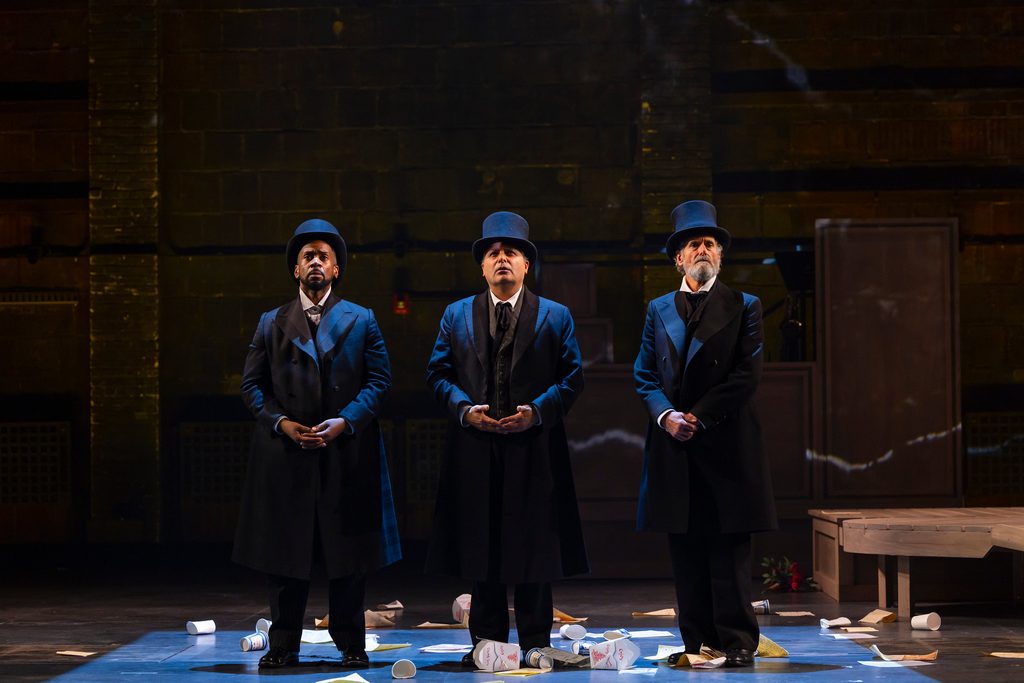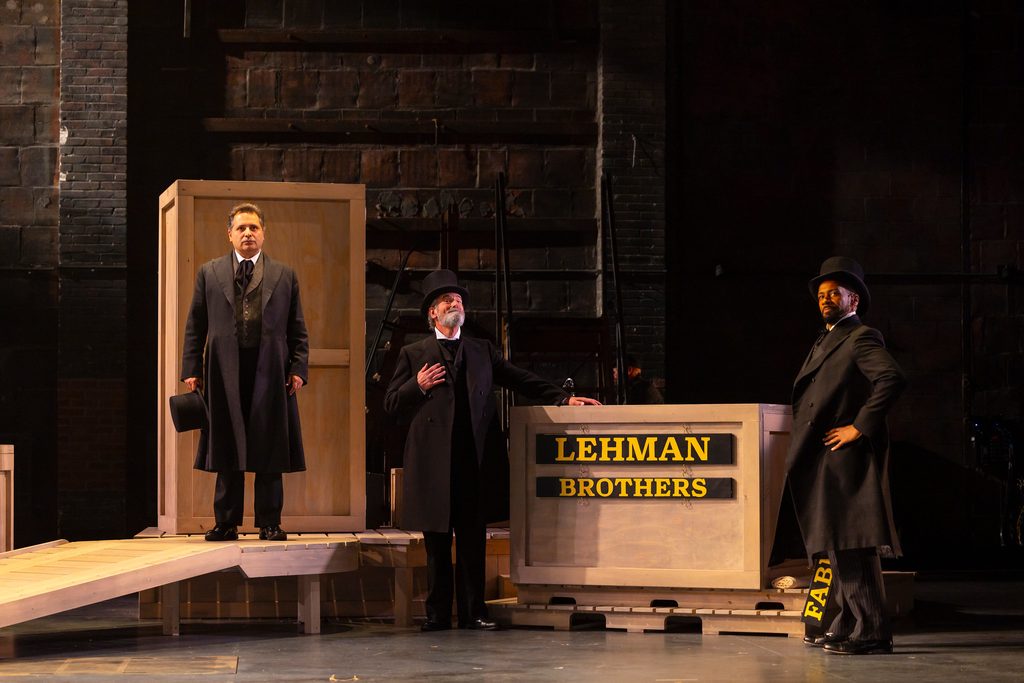
Photo by T. Charles Erickson.
Presented by The Huntington
By Stefano Massini
Adapted by Ben Power
Directed by Carey Perloff
Featuring Joshua David Robinson, Steven Skybell, Mayer Lehman
Music performed by Joe LaRocca
Dramaturgy by Julie Felise Dubiner
June 29 – July 23, 2023
264 Huntington Ave.
Boston, MA 02115
Critique by Maegan Bergeron-Clearwood
Update: This article previously credited Carey Perloff as the former artistic director of the incorrect institution. Perloff was the AD of American Conservatory Theater.
BOSTON, Mass. — If the playbill for The Lehman Trilogy is any indication, The Huntington artistic team knows that are dealing with a flawed, if renowned, play. The three-and-a-half-hour epic has a developmental history of international proportions: Italian playwright Stefano Massini’s play about Jewish-American bankers was adapted by British playwright Ben Power, then enjoyed critical acclaim on the West End before transferring to Broadway and winning the 2022 Tony Award for Best Play.
The production was a critical darling, but never without its skeptics. Think-pieces abound have accused the play of a) pandering in antisemitic tropes and b) sidestepping the centrality of slavery in the Lehman brothers’ (and more broadly, capitalism’s) rise to power.
Having now seen the play, I agree with these critiques (I would even add misogyny to the list of accusations, given how the text either erases or caricaturizes all of its female characters). The Lehman Trilogy is enormous in scope, covering 163 years of history, but strangely hollow in meaning. The language is exhaustingly expositional: three performers — Steven Skybell, Joshua David Robinson, Firdous Bamji – play three generations’ worth of characters, speaking primarily in third person to deliver external facts rather than disclose internal thoughts. This intent of this presentational convention is, I think, to emphasize the mythologization of the Lehman family’s story, but the result is alienating, with the performers functioning more as narrators than characters.
The result is also disturbing. We watch the family’s immigration story and learn about their banking empire, but we never come to understand the political or emotional motivations that led them to such circumstances. The American dream mythology – in this case the Jewish-American dream mythology – did not emerge in a sociopolitical vacuum, but The Lehman Trilogy would have us think so. In style and subject matter, the play feels like an act of documentary theater, but one that’s intentionally leaving out crucial documentation. Sans humanization or contextualization, the Lehmans are implied to have only two character traits: they are Jewish, and they are greedy — an antisemitic combination if I’ve ever encountered one.
The Huntington’s staging, with former American Conservatory Theater artistic director Carey Perloff at the helm, marks the play’s first American production, and the team seems to understand the stakes of this undertaking. The playbill features rich dramaturgical contributions from Julie Felise Dubiner, including interviews with scholars about the racist underpinnings of American capitalism (the play disengages from these themes, refusing to even name the fact that the Lehmans owned slaves) and a beautiful essay about the mythologization of the American dream from a distinctly Jewish perspective. There’s an acknowledgment and attempt to remedy, on paper at least, of the play’s gaping dramaturgical holes.
The staging is not as successful in this regard, feeling broadly superficial and static, but it does manage to make banking feel theatrical, which is no small feat. Perloff’s direction is vibrant and playful, and Sara Brown’s scenic design – an ever-reconfiguring landscape of giant packing crates – not only provides opportunity for creative storytelling, but also serves as a visual reminder of the Lehmans’ humble beginnings, even as they lose touch with those roots.
The storytelling relies heavily on splashy production elements to indicate dramatic turning-points to the audience – useful for raising the stakes in a play that’s saturated with financial jargon (and for keeping the audience awake). For me, the production verged toward sensory overwhelm at times – the abrasive sound, lighting, and projection choices were often more physically shocking than dramaturgically helpful. I don’t usually include content warnings in my reviews but thought it worth underscoring these production elements, as well as references to and depictions (not graphic) of suicide, which I found to be gratuitous.

Photo by T. Charles Erickson.
Skybell, Robinson, and Bamji bring the play’s expositional language to life with admirable agility, and they certainly rise to the task of what is essentially a three-plus-hour test of physical endurance. One of the production’s most egregious faults, however, is the performers’ accent work. The performers play multiple roles without the aid of costume changes; dialect is one of their primary tools for distinguishing character, so the poor accent work is particularly noticeable.
Most distracting is the performers’ attempts to sound Yiddish (the first generation of Lehmans were Bavarian Jewish immigrants). Their accents are almost comically inaccurate and inconsistent, but also telling of a broader issue, which is how the play flattens Jewish identity and practice.
The first act is full of Jewish ritual: the brothers close shop doors on Shabbat, light Chanukah candles, and sit Shiva and say Kaddish for the deceased. These rituals – along with accents and other Jewish signifiers – dissolve as the family assimilates and expands their empire. This shift should feel meaningful to the audience, but even in the first act, the rituals don’t seem to mean anything to the characters; they light the candles and recite the prayers, but there is no exploration of how these practices inform their values or identities. So when the rituals disappear, it’s not much of a loss.
To me and my theatre companion, Jewish practice is textured and rich; it is inextricably tied to our values, relationships, and how we move through the world. To see Jewish identity treated like a prop – shown but not embodied – was alienating.
Based on the above-mentioned dramaturgical materials, I sense that deep care went into this production, and my qualms lie more heavily with the text than the staging. So I’m left wondering: Why this play now? Why produce this play in this moment for this community? I ask these questions every time I step into a theater, and with this production, I’m particularly stumped.
I think that The Lehman Trilogy wants to be a parable about the American Dream, using one infamous family’s saga as a stand-in for the broader failures of capitalist greed. But universal stories are best told through specificity: in asking an audience to see the world from a particular, humanized perspective, broader messages take shape.
Here, despite the artistic team’s best efforts, we get erasure and caricature in the guise of allegory. So why produce this play here and now? As antisemitism is on the rise and the United States continues to ignore the ongoing legacy of slavery? I cannot think of a good answer. I simply hope that The Huntington’s 2023-24 season makes better production choices.
